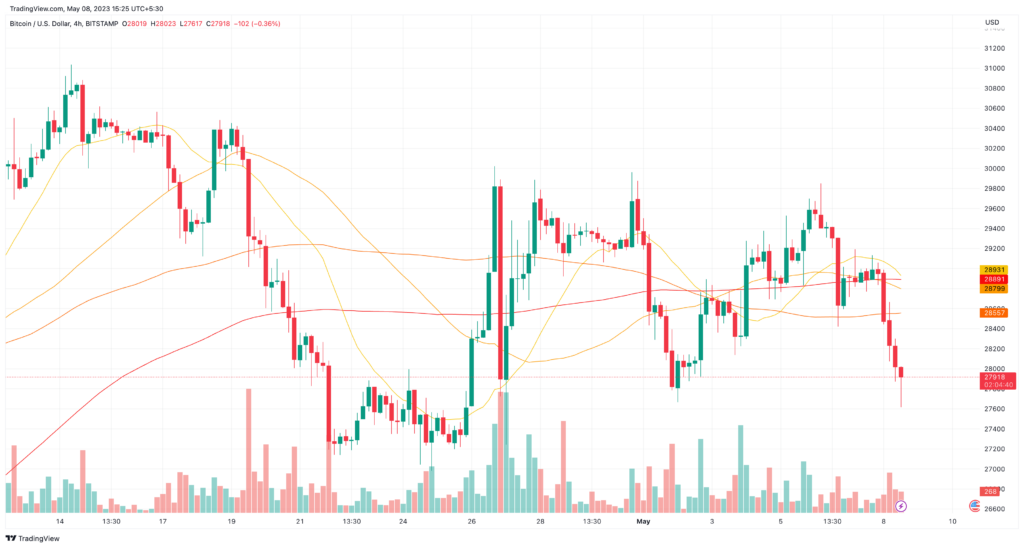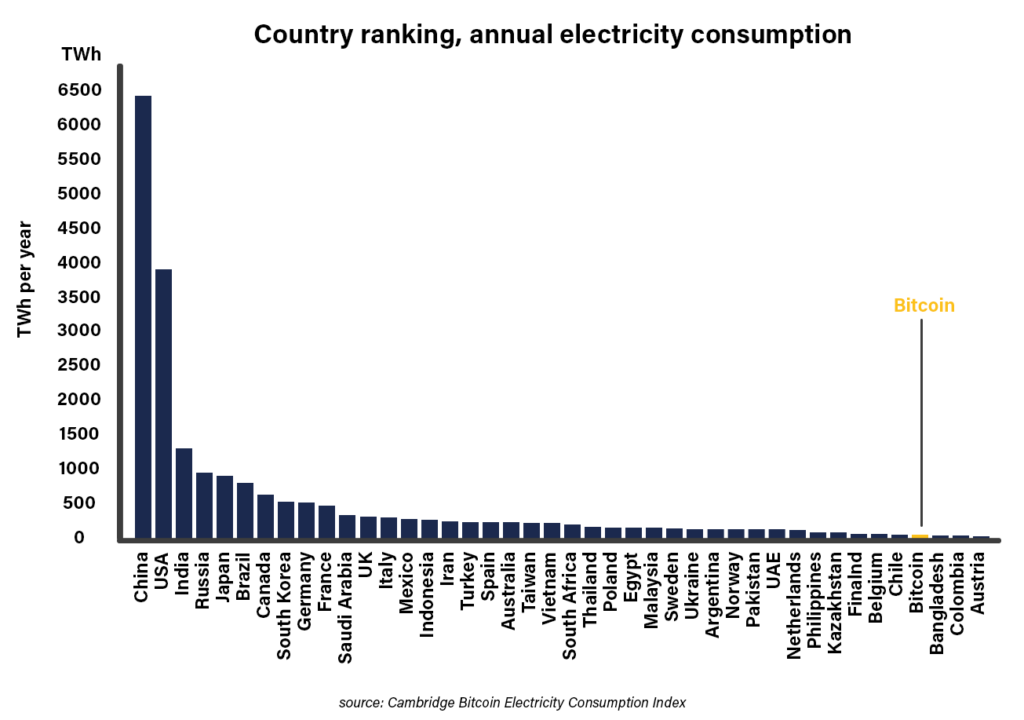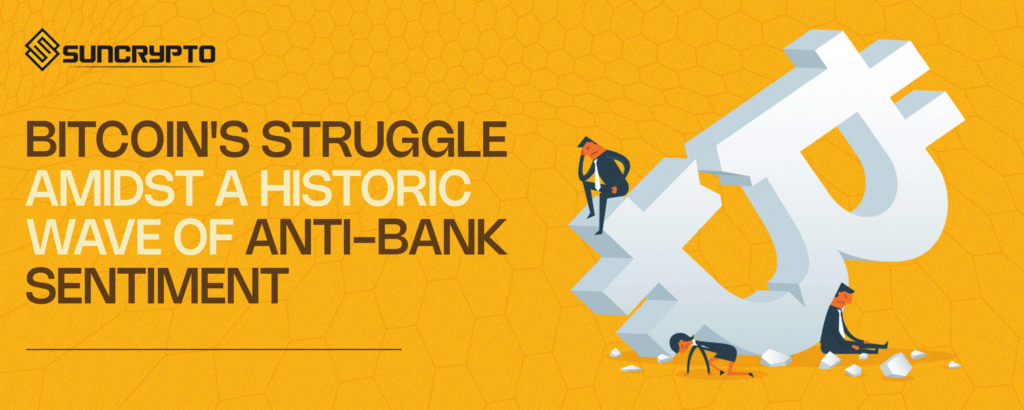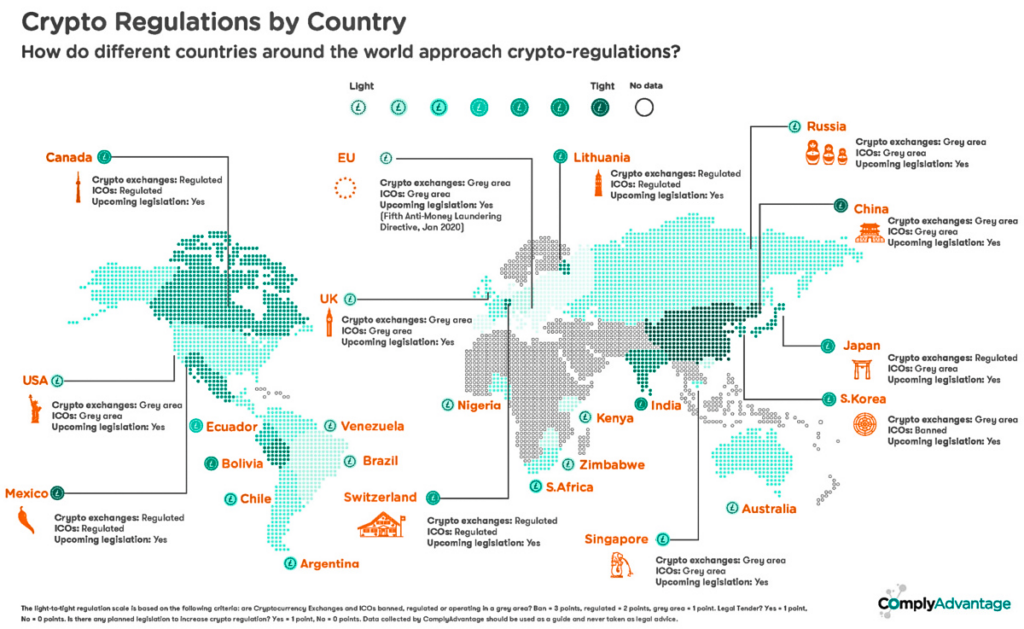The world of finance is in a state of flux as the traditional banking sector faces unprecedented challenges, an Anti-Bank Sentiment. In the midst of all this turmoil, Bitcoin (BTC) has emerged as a potential savior for investors looking for a stable, decentralized alternative to fiat currencies. However, despite the widespread expectation that BTC would see a surge in value and adoption in the face of the banking crisis, the reality is quite different.
The struggles of Bitcoin have been well-documented, with the digital currency facing a range of challenges that have hindered its growth and adoption. From regulatory hurdles to environmental criticisms, Bitcoin has been forced to navigate a complex landscape that has tested its resilience and staying power.
Despite these challenges, there is no doubt that Bitcoin remains a potent force in the world of finance. In this article, we will delve deeper into the complexities of Bitcoin’s struggles, exploring the various obstacles it faces as it seeks to cement its place in the global financial landscape.
Anti-Bank Sentiment Vs Bitcoin: Hype or Hope?
Despite the rising Anti-Bank Sentiment, Bitcoin’s rise remains solidly grounded. As the public’s trust in established financial institutions dwindles, the original cryptocurrency, Bitcoin, should skyrocket. However, a slew of factors, including regulatory ambiguity, environmental concerns, and competing digital currencies, have stifled its expansion.

The public’s faith in traditional banks has been severely undermined by the 2008 financial crisis and subsequent banking scandals. This leads many to seek alternative financial solutions. That has driven Bitcoin into the mainstream. Since it operates as a decentralized currency beyond the control of central banks and governments. And has the potential to democratize finance and empower individuals.
Despite its potential, BTC faces challenges in gaining broad acceptance, with regulatory uncertainty causing hesitation among potential users and investors. Governments and financial regulators worldwide are wrestling with the implications of digital currencies and have imposed a range of restrictions and guidelines.
In addition, Bitcoin’s potential is overshadowed by environmental issues. The mining process, which demands substantial computational power, results in a significant carbon footprint. This raises concerns about its impact on the environment.
Bitcoin Vs the Environment: The High-Stakes Game of Digital Currency
A few years back, the University of Cambridge estimates that the yearly energy consumption of Bitcoin surpasses that of countries like Argentina or the Netherlands. This has led to criticism from environmentalists and the wider public who are becoming more aware of the effects of climate change.

In addition, Bitcoin’s challenges have been further complicated by the emergence of competing cryptocurrencies. As newer cryptocurrencies like Ethereum, Solana, and Cardano gain popularity, they offer unique features and advantages that cater to diverse user requirements. Some of these alternatives offer faster transaction speeds, lower fees, or improved privacy, posing significant competition to Bitcoin. As a result, the market has become fragmented, and Bitcoin’s once-dominant position has been diluted.
As a result, Bitcoin’s growth remains static despite growing discontent with traditional financial institutions. Its failure to capitalize on this potential can be linked to the complicated interplay of regulatory uncertainty, environmental concerns, and the evolving digital currency landscape.
Regulatory Roadblocks
Bitcoin has faced regulatory roadblocks since its inception. With governments struggling to come to grips with its decentralized nature and potential implications. While some countries have embraced it, others remain hesitant, and a few have even banned it outright. This regulatory uncertainty has created a challenging environment for Bitcoin. That has hindered its growth and adoption.
One of the main concerns of governments is the potential for Bitcoin to facilitate criminal activities, such as money laundering and terrorism financing. While these concerns are not unfounded, they have led to a disproportionate focus on the negative aspects of Bitcoin, rather than its potential benefits. Governments have responded by imposing strict regulations on Bitcoin, which has slowed down its growth and adoption.
China’s blanket ban on cryptocurrency transactions is a prime example of how regulatory uncertainty can inhibit Bitcoin’s growth. China was once the world’s largest market for Bitcoin. However, the government’s hostile stance towards cryptocurrencies has forced many investors and users to seek alternative avenues. The ban has also created a lot of confusion and uncertainty. This leads many unsure about the legality of holding or using Bitcoin in China.
However, not all countries are as hostile towards Bitcoin. Some, such as El Salvador, have even gone as far as to make it legal tender. This move has been hailed as a major milestone for Bitcoin and has boosted its credibility as a legitimate form of currency. Other countries, such as the United States and Japan, have taken a more cautious approach. These countries have implemented regulations that seek to strike a balance between innovation and security.
Bitcoin’s Green Dilemma
Bitcoin mining has been the subject of much scrutiny and debate in recent years. With environmental concerns are one of the main areas of contention. The process of mining bitcoins is energy-intensive, with miners using specialized computer hardware to solve complex mathematical equations. In order to validate transactions and secure the network.
This process requires a tremendous amount of electricity, and as Bitcoin has grown in popularity, so has its energy consumption. Critics of Bitcoin mining argue that the amount of electricity used in the process is not sustainable. And that it has a significant impact on the environment.
According to some estimates, Bitcoin mining consumes as much electricity as entire countries such as Argentina and Norway. This has led to concerns about the carbon footprint of Bitcoin. To that end, some experts believe that cryptocurrency could contribute to climate change if its energy usage is not curtailed.
The environmental impact of Bitcoin mining is a major concern for many people, particularly those who are environmentally conscious. As a result, eco-friendly alternatives to Bitcoin have emerged, such as Ethereum’s transition to a proof-of-stake consensus mechanism.
However, it’s important to note that there are efforts underway to make Bitcoin mining more sustainable. Some companies are exploring ways to use renewable energy sources, such as solar and wind power, to power their mining operations. Additionally, there are proposals to make the mining process more energy-efficient. Proposals like using more advanced hardware that consumes less electricity.
Bitcoin’s Second Chance: Key Drivers That Could Spark a Price Revolution
Regardless of these challenges, Bitcoin is not doomed. Several variables may fuel its rise, propelling it back into the spotlight. For example, the Lightning Network’s ongoing development promises to improve Bitcoin’s scalability, allowing for faster and cheaper transactions. This improvement has the potential to reignite interest in BTC.
Furthermore, as central banks investigate the issuance of digital currencies (CBDCs), public interest in cryptocurrencies may increase. Bitcoin, as the most well-known name in the field, may profit from the increased attention.
In short, institutional acceptance of cryptocurrencies as a store of value or inflation hedge could provide credibility to Bitcoin. As more corporations incorporate Bitcoin into their balance sheets, the cryptocurrency’s reputation may improve, attracting additional investment.
Conclusion
The current situation of BTC begs the question, “If not now, when?” Will Bitcoin ever reach the stratospheric height of a $1 million price by the end of 2023, as some predict? While the road ahead remains unpredictable, Bitcoin’s future is dependent on its ability to overcome the hurdles it is currently facing.
To flourish, Bitcoin has to cross the murky waters of regulatory uncertainty, adapt to a more ecologically concerned world, and outmaneuver its competitors. Only then it will be able to capitalize on anti-bank sentiment and establish itself as a viable alternative to traditional finance.
To know more about Bitcoin’s struggles against the Anti-Bank Sentiment, go check out SunCrypto Academy.
Disclaimer: Crypto products and NFTs are unregulated and can be highly risky. There may be no regulatory recourse for any loss from such transactions. All content provided is for informational purposes only, and shall not be relied upon as financial/investment advice. Opinions shared, if any, are only shared for information and education purposes. Although the best efforts have been made to ensure all information is accurate and up to date, occasionally unintended errors or misprints may occur. We recommend you to please do your own research or consult an expert before making any investment decision. You may write to us at [email protected].







